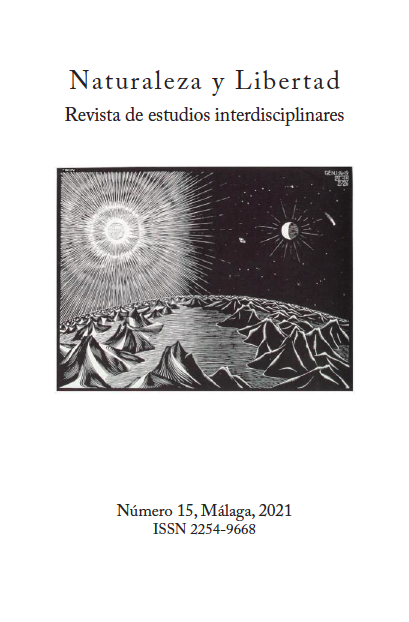Inteligencia Artificial; sujeto de Derecho; originalidad; cuasi autor; personalidad ciberhumanoide.
DOI:
https://doi.org/10.24310/NATyLIB.2021.vi15.12773Keywords:
Artificial Intelligence, Subject of Law, Originality, quasi-author, Cyberhuomoid personalityAbstract
This article analyzes the legal-philosophical situation of Artificial Intelligence and the intelligent robot on being a subject of law to be considered a creative person or author. The contradiction involved in allowing an object to present the legal duality of being protected as an object that is and at the same time considered subject by the resulting work is analyzed, an impairment or vulgarization for the subject of Law as a moral subject when proposing the fictio legis of a moral object, which is not conceivable. Instead, an alternative to such an aporia is proposed, more fictitious than real.
Downloads
Metrics
References
Amado Osorio, N. E., 2020. El derecho de autor en la inteligencia artificial de machine learning. La propiedad inmaterial, Volumen 30, pp. 327-353.
Antequera Parilli, R., 2007. Estudios de derecho de autor y derecho afines. Madrid: Editorial Reus.
Azuaje Pirela, M. & Finol González, D., 2020. Transparencia algorítmica y la Propiedad Intelectual y Industrial: tensiones y soluciones. Revista Propiedad Inmaterial, Issue 30, pp. 111-146.
Bendito Cañizares, M. T., 2021. Estadio intermedio de reflexión para una futura regulación de la ética en el espacio digital europeo: los principios de transparencia y accountability. Revista Aranzadi de Derecho y Nuevas Tencologías, Issue 5, pp. 1-57.
Bercovitz Rodríguez-Cano, R., 1992. Comentario a la sentencia del Tribunal Supremo, de 26 de octubre de 1992. Cuaderno Cívitas de Jurisprudencia Civil, Issue 30, pp. 959-970.
Chávez Valdivia, A., 2020. Rediseñando la titularidad de las obras: Inteligencia artificial y robótica. Revista chilena de Derecho y Tecnología, 9(2), pp. 153-185.
Copeland, J., 1993. Cap. 9 "are we computers?". En: Artificial Intelligence: Philosophical Introduction. New Jersey: Wiley-Blackwell, pp. 180-204.
Corvalán, J. G., 2017. La primera inteligencia artificial predictiva al servicio de la Justicia: Prometea. LA LEY, pp. 2-5.
Díaz-Limón, J. A., 2016. Daddy’s Car: la inteligencia artificial como herramienta facilitadora de derechos de autor. La Propiedad Inmaterial, Issue 22, pp. 83-100.
Fernández Carballo-Calero, P., 2021. La Propiedad Intelectual de las obras creadas por Inteligencia Artificial. Navarra: Editorial Aranzadi.
Grandhi, N. M., 2020. ¿Puede la Inteligencia Artificial ser un sujeto de Derecho?. Simposio Argentino de Informática y Derecho (Jaiio), pp. 54-61.
Hohfeld, W. N., 1913. Conceptos jurídicos fundamentales. México: Fontamara.
Lee, E., 2012. Digital originality. Vanderbilt J. of Ent. and Tech. Law, 14(4), pp. 919-957.
López de Mántaras, R., 2017. La inteligencia artificial y las artes. Hacia una creatividad computacional. En: El próximo paso: la vida exponencial. Madrid: BBVA, pp. 99-123.
Marcos, A., 2015. La mejora (de la vida) humana: una reflexión antropológica y ética. Madrid, Cátedra de Bioética, UPCO, Madrid, p. 4.
Peinado Gracia, J. I., 2018. Lección 11. La propiedad intelectual: derechos de autor y derechos afines. En: Lecciones de Derecho Mercantil. Volumen I. Navarra: Thomson Reuters-Civitas, pp. 211-236.
Ríos Ruiz, W. R., 2001. Los sistemas de inteligencia artificial y la propiedad intelectual de las obras creadas, producidas o generadas mediante ordenador. La Propiedad inmaterial, Issue 3, pp. 5-13.
Rodríguez Tapia, J. M., 2009. Título II: Sujeto, objeto y contenido. Capítulo I: sujetos. En: Comentarios a la Ley de Propiedad Intelectual. Navarra: Thomson Reuters-Civitas, pp. 97-119.
Saiz García, C., 2019. Las obras creadas por sistemas de inteligencia artificial y su protección por el derecho de autor. Indret: Revista para el análisis del Derecho, Volumen 1, pp. 1-45.
Santos González, M. J., 2017. Regulación legal de la robótica y la inteligencia artifical: retos del futuro. Revista jurídica de la Universidad de León, pp. 25-50.
Sauca, J. M., 2000. Lección undécima: Los conceptos jurídicos fundamentales (II). En: Curso de Teoría del Derecho. Madrid: MARCIAL PONS, pp. 284-286.
Valente, L. A., 2019. La persona electrónica. Anales De La Facultad De Ciencias Juridicas Y Sociales De La Universidad Nacional De La Plat, Issue 49(01), pp. 1-30.
Vásquez Leal, L., 2020. ¿Autoría algorítmica? Consideraciones sobre la autoría de las obras generadas por inteligencia artificial. Revista Iberoamericana de la Propiedad Intelectual, Issue 13, pp. 207-233.
Yanisky-Ravid, S., 2017. Generating Rembrandt: Artificial Intelligence, Copyright, and Accountability in the 3ª Era: The Human-like Authors Are Already Here: A New Model. Mich, St. L. Rev. 659, Issue 4, pp. 659-726.
Downloads
Published
How to Cite
Issue
Section
License
Those authors who have publications with this journal, accept the following terms:
1. Copyright and licensing information are clearly described on the journal’s web site: all content published in Naturaleza y Libertad is open acces without limit, and are subject to the Attribution-NonCommercial-ShareAlike 4.0 International (CC BY-NC-SA 4.0) license. The full text of which can be consulted at https://creativecommons.org/licenses/by-nc-sa/4.0/
2. It is the responsibility of the authors to obtain the necessary permissions for the images that are subject to copyright. The authors whose contributions are accepted for publication in this journal will retain the non-exclusive right to use their contributions for academic, research and educational purposes, including self-archiving or deposit in open access repositories of any kind. The electronic edition of this magazine is edited by the Editorial de la University of Malaga (UmaEditorial), being necessary to cite the origin in any partial or total reproduction.
3. This journal allows and encourages authors to publish papers on their personal websites or in institutional repositories, both before and after their publication in this journal, as long as they provide bibliographic information that accredits, if applicable, your posting on it.
4. In no case will anonymous papers be published.





18.png)













